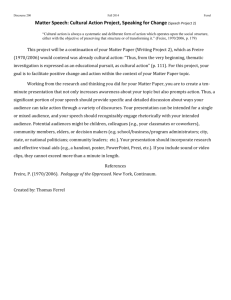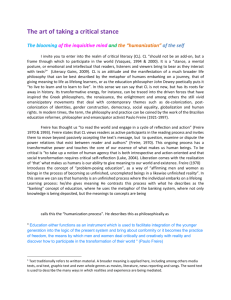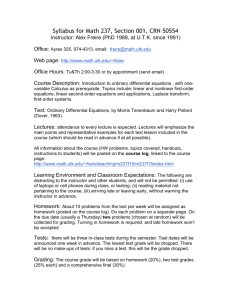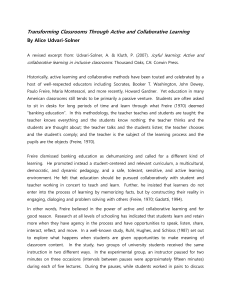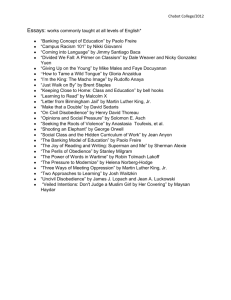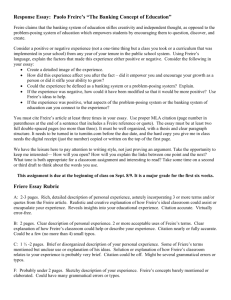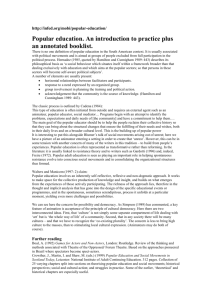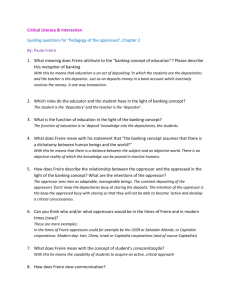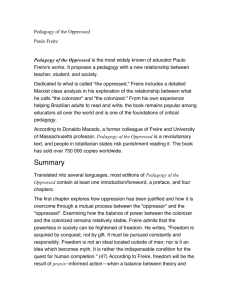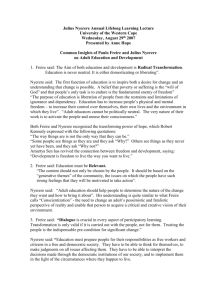Critical Analysis
advertisement
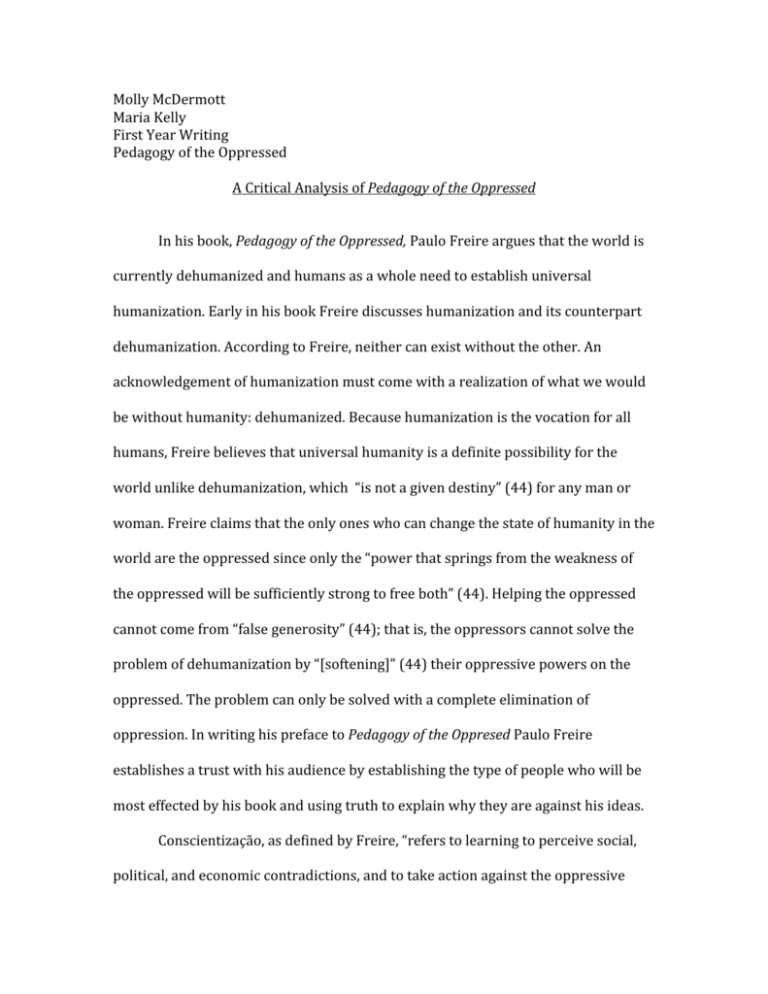
Molly McDermott Maria Kelly First Year Writing Pedagogy of the Oppressed A Critical Analysis of Pedagogy of the Oppressed In his book, Pedagogy of the Oppressed, Paulo Freire argues that the world is currently dehumanized and humans as a whole need to establish universal humanization. Early in his book Freire discusses humanization and its counterpart dehumanization. According to Freire, neither can exist without the other. An acknowledgement of humanization must come with a realization of what we would be without humanity: dehumanized. Because humanization is the vocation for all humans, Freire believes that universal humanity is a definite possibility for the world unlike dehumanization, which “is not a given destiny” (44) for any man or woman. Freire claims that the only ones who can change the state of humanity in the world are the oppressed since only the “power that springs from the weakness of the oppressed will be sufficiently strong to free both” (44). Helping the oppressed cannot come from “false generosity” (44); that is, the oppressors cannot solve the problem of dehumanization by “[softening]” (44) their oppressive powers on the oppressed. The problem can only be solved with a complete elimination of oppression. In writing his preface to Pedagogy of the Oppresed Paulo Freire establishes a trust with his audience by establishing the type of people who will be most effected by his book and using truth to explain why they are against his ideas. Conscientização, as defined by Freire, “refers to learning to perceive social, political, and economic contradictions, and to take action against the oppressive elements of reality” (36). Freire uses this term to explain who is afraid of freedom: the people who doubt conscientização. He explains that these freedom fearers are afraid of fanatic behavior from the oppressed if the oppressed develop a critical consciousness to evaluate their social status. The doubters would rather that the oppressed never realize their state of injustice so that they do not disrupt the delicate social order that places the doubters (oppressors) on top. After detailing the freedom fearer’s argument, Freire argues against their rationalization using a quote from Francisco Weffort. Weffort explains that, “The awakening of critical consciousness leads the way to the expression of social discontent precisely because discontents are real components of an oppressive situation” (36). Freire agrees with Weffort and explains that in actuality, the oppressed will proceed as “responsible Subjects” (36) instead of disruptive fanatics. The oppressed will evaluate their role in society and realize their purpose is to spread a revolution of humanity to the whole world. Although these doubters of conscientização are unfairly critical of a world with universal humanization, Freire points out that they are not always aware of their fear. Freire quotes Georg Hegel who explains, “It is solely by risking life that freedom is obtained; …” (36). Therefore, freedom fearers are avoiding freedom, sometimes subconsciously, as a means to maintain their personal security. Seldom do humans acknowledge their fear of freedom to others, let alone themselves. Instead, they display themselves as defenders of freedom. Freire explains that the freedom fearers “confuse freedom with the maintenance of the status quo; so that if conscientização threatens to place that status quo in question, it thereby seems to constitute a threat to freedom” (36). Freedom fearers are afraid to sacrifice their social status and therefore their life, for freedom. Because of the sacrifice and commitment it requires for someone to join the revolution for universal humanization, Freire states that the ideas of his book are for radicals. Before even explaining his master plan for humanizing the world, Paulo Freire warns the audience that not all of his ideas will be positively received. Freire honestly explains that he has different methods of helping the world than others, such as the Christians or Marxists, do. He concludes then, that his “admittedly tentative work is for radicals” (37). According to Freire, radicalism is a good thing because it is both critical and creative. Since radicals can choose a certain position to support, they become more attached to defending their choice since they are defending it willingly and not by force. In that way, radicals tend to be more passionate about what they are fighting for and more engaged in the struggle. Freire explains why sectarianism, opposed to radicalism, would be a bad thing. Sectarianism is confining and deprives you of having individual, creative thoughts. In addition, sectarians “[mythicize]” (37) and therefore isolate themselves from any ideas or people that are different from them. Freire explains how neither the rightist nor leftist sectarian can achieve freedom. The rightist will believe that the present situation will continue to play out into the future. The leftist believes that the future is already predetermined and cannot be changed. Despite these seemingly distant ways of viewing the world, Freire says that neither the rightist nor leftist will become “spectators” (38) of history. Instead, both parties lock themselves into their decided ideas and force their own truth to come true; they regard anything contrary to their truth a lie. The radical, Freire explains, is more able to “transform” (39) reality since they can see the whole situation and not just one part like the sectarians do. Just as a radical can view the entire situation before choosing which position to support, Paulo Freire can see the view point of those he opposes and yet still explain why he disagrees with their point of view. In his preface to Pedagogy of the Oppressed, Freire combines his knowledge of human physiology, first hand experience with the oppressed and the knowledge of other scholars to prove the validity of his arguments. He believes that in order to spread humanity to all men and women, radicals need to embrace his plan to eliminate oppression. Freire admits that he is still a learner, but he plans on continuing to observe the lower classes and modify or expand on his doctrine. Freire encourages those who will read his book and find the flaws with his arguments. He also hopes that his book will inspire dialogue among the ones who read it even if the dialogue is to criticize his arguments. By admitting to his weaknesses, Freire does not sound less believable; on the contrary, his honesty works in his favor to prove that the accounts he has presented are accurate of an oppressed society.
